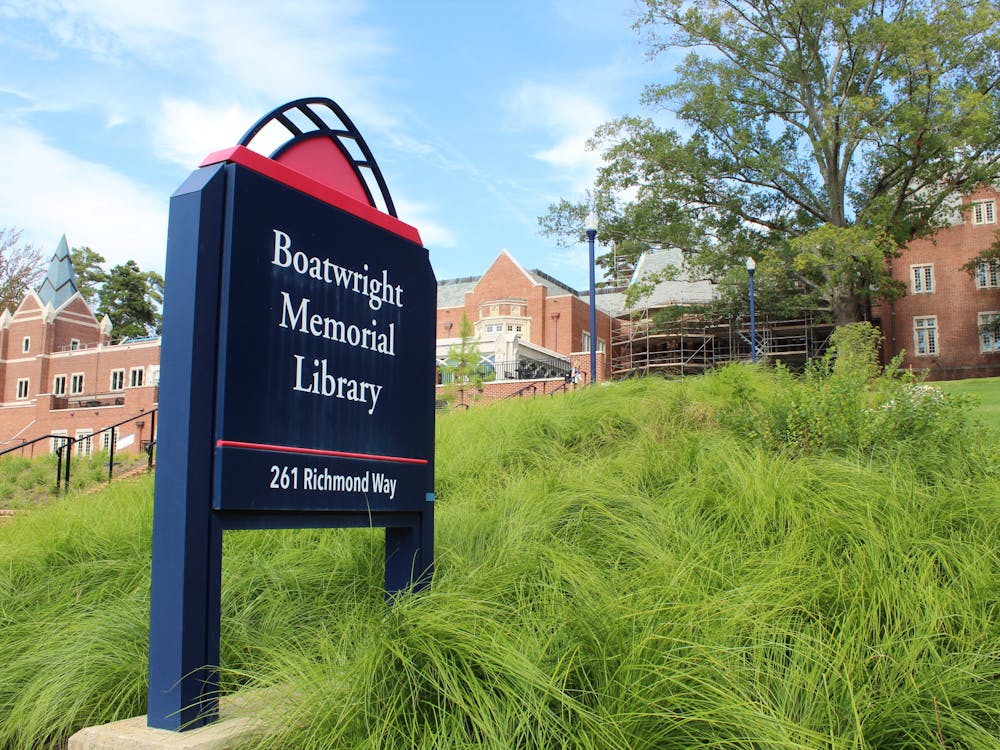Collegian Reporter
One of the secrets of Lincoln's success was that he tended to do his reacting in advance, said the third Jepson Leadership Forum speaker last night at the Jepson Alumni Center.
The 2008-09 Jepson Leadership forum was planned last year to celebrate the 200th anniversary of Lincoln's birth, Feb. 12, 1809, said Al R. Goethals, a professor of leadership studies.
During his presentation, "Abraham Lincoln and the Shaping of Public Opinion," Douglas L. Wilson read from his book, "Lincoln's Sword: The Presidency and the Power of Words," which won him his second Lincoln prize in 2007.
One topic he focused on was Lincoln's unsuspecting literary ability and how it was a hidden asset in connecting with constituents.
"His honest, friendly and colorful speech was unrefined and most detected no sign of a gifted writer," Wilson said, yet he certainly was.
For example, Lincoln's public letters hit his audiences with maximum impact like a punch to an unsuspecting person, Wilson said.
Lincoln was a great writer and a great rhetorician; some of his speeches and letters are the most impressive documents in American history, Goethals said.
"And [Wilson] has written about those in 'Lincoln's Sword,' more clearly, more usefully and more informatively than anyone else," he said.
Lincoln drew inspiration for many of his speeches from scraps of paper that he kept in a drawer of his desk, Wilson said. Lincoln believed his thoughts came more clearly to him when he was not deliberately trying to write something, Wilson said.
"Wilson is one of the most important scholars," Goethals said. "Maybe the most important scholar, who talks about Lincoln's language and use of words."
Enjoy what you're reading?
Signup for our newsletter
He is the co-director with Rodney O. Davis at the Lincoln Studies Center at Knox College in Galesburg, Ill., as well as the George A. Lawrence Distinguished Service Professor Emeritus.
Of the five books he wrote, "Honor's Voice: The Transformation of Abraham Lincoln," was the hardest to write, he said. This is because it was about Lincoln's early years and he had to construct it from so many different pieces of testimony and without a paper trail, he said.
"You're dealing with human memory and you have people who remember different things or don't agree," he said. "It's very excruciating to try to sort through this memory-based evidence and determine what's the likeliest picture."
Wilson signed a contract for "Honors Voice" in 1991 and it wasn't published until 1998, he said. He received the Lincoln prize for the first time in 1999 for this book.
One of the things that Wilson admired most about Lincoln was his ability to put aside the things that interfered with people's judgment, he said.
"He was not egotistic. He could appoint people that didn't like him and had been his enemies and said terrible things about him. But if he thought that they would be the best person for the job, he was capable of appointing them."
For instance, Lincoln appointed Edwin Stanton as his secretary of war, Wilson said. Stanton was a headstrong democrat, who was opposed to his election and said terrible things about him, he said.
"Stanton was a great choice and served him well. But I think most people in Abraham Lincoln's position - because Stanton had been such an enemy and such a critic - would find it impossible to appoint him," Wilson said.
"He thought the government was more important than rewarding party loyalists and deliberately spread the appointments around to both parties.
"This was an amazingly hard and rare thing to do. Yet he did it to rare effect and proved that we too often let egotism and personal motives get in our way when we need to be focusing on a bigger picture."
Students thought that the presentation revealed many unexpected facts about Lincoln. "I personally like Lincoln so it was cool to learn more about his life," freshman Ty Williams said. "It was interesting to hear about how Lincoln was able to use words so effectively to influence the country and bring people together."
A community member who attended said that she learned a lot of unique things about Lincoln from Wilson. "I didn't realize that Abraham Lincoln was such a thinker before he spoke," Liz Emberson said. "I think a man of few words is wise so I have a much higher respect for him now."
Contact reporter Taylor Engelson at taylor.engelson@richmond.edu
Support independent student media
You can make a tax-deductible donation by clicking the button below, which takes you to our secure PayPal account. The page is set up to receive contributions in whatever amount you designate. We look forward to using the money we raise to further our mission of providing honest and accurate information to students, faculty, staff, alumni and others in the general public.
Donate Now


